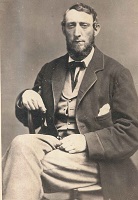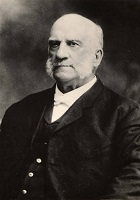Iowa’s early settlers advocated for agricultural education during the first legislative sessions and in publications across the state. Once the legislature agreed, these early advocates dedicated time and talent to the establishment of a remarkable agricultural college and model farm.
Benjamin Gue
Benjamin Gue – a Scott County farmer, newspaper editor, and state legislator – led the legislative charge for an agricultural college and model farm in the 1850s. His dedication and determination made certain Iowa had a top-notch ag college with the best faculty available, and that women were allowed to enroll.
As an early Board of Trustees president, he dedicated the institution on March 17, 1869, to the education of the working people of Iowa. He helped put in place the solid foundation of a world-class university. It is the foundation on which Iowa State University success today is built. Without Gue there would be no ISU.
 Peter Melendy
Peter Melendy
Peter Melendy was proficient at many things - agriculturalist, writer, Cedar Falls mayor, and U.S. Marshall – but it was his energy and willingness to serve that benefited the Iowa Agricultural College during its early years. He had the responsibility to identify 240,000 acres of federal land for Iowa's claim under the Morrill Act – and he did it in 3 months.
Melendy also gets credit for the planning and aesthetic beauty of central campus. As landscaping consultant to President A. Welch he oversaw the installation of several hundred ornamental and shade trees and shrubbery. In 1867 he selected prime breeding stock for the college’s model farm.
Melendy served the college until 1872, molding the curriculum and practices of the institution.
Suel Foster
The Iowa prairie was an adventure for Suel Foster, one where he took on a significant role building the new state. His love for the wildwoods, trees, horticulture, and education for the business of agriculture positioned him as a leader of many important developments of the young state.
He was the first to publicly advocate for an agricultural college for Iowa. He felt "every farmer’s son and daughter must be educated for the science of farming – the greatest of all sciences. It is high time the state of Iowa was laying the foundation for this education.”
A member of the college’s first Board of Directors, his vote determined the college location.
 Seaman Knapp
Seaman Knapp
Seaman Knapp, the first Chair of Agriculture at the Iowa Agricultural College, was responsible for developing the agricultural curriculum and conducting early experiments in animal husbandry, dairy industry, and farm crops. While living in the Farm House, Knapp helped draft the 1883 Experiment Station Bill that was presented to the United States House of Representatives. He served a one-year term as Iowa State's second president (1883-1884).
Knapp is nationally referred to as the Father of Extension.
Gov. Ralph P. Lowe
Lowe signed the bill on March 22, 1858, to establish the Iowa Agricultural College and Model Farm. In his statement at that time, he called the agricultural college “higher education drawn from problems of life and preparing for the problems of life and higher education to all people whether rich or poor, whether from the farm or the factory, the stable or the stock market.”
Iowa State University has become the land-grant university that embodies the institution he envisioned.
